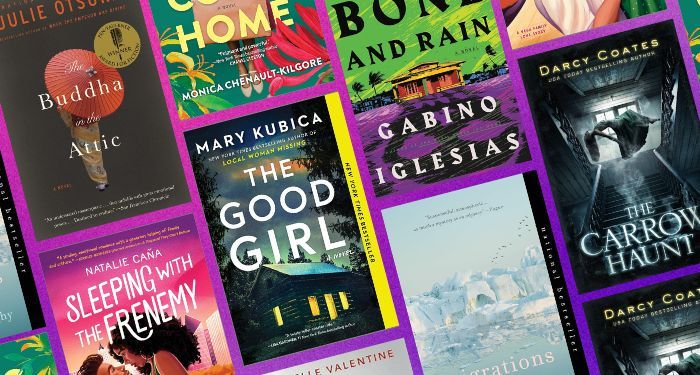12 Brilliant Short Stories by Black Writers to Read Year-Round

From one girl’s aspiration to Olympic gymnastics glory, to a boy’s stint living in the Idaho wilderness in hopes of fixing his unruly behavior, something that remains a guiding principle in Black storytelling is the breadth of our lives. These stories, a collection of some of EL’s most-loved fiction by Black writers, all published in our weekly fiction vertical Recommended Reading, affirm something we know to be true: that Black people are everywhere. The landscape of our lives is vast, ever-evolving, and no matter where we go and who we are, we always leave a mark.
Below are 12 brilliant short stories by Black writers to read year-round, one for each month of the year.—Denne Michele Norris
“A New World†by Kristen Gentry, recommended by Deesha Philyaw
In Kristen Gentry’s “A New World,†from her collection Mama Said, Parker is balancing caring for many women in his life: his ex-wife Claudia, who is recovering from addiction, his 16-year-old niece Zaria, who is giving birth to her first child, and his 15-year-old daughter JayLynn, who has recently started having sex with her boyfriend. While Parker attempts to “make things work†and protect JayLynn from the same fate as Zaria, JayLynn is desperately trying to save her own mother. Most of all, Parker doesn’t want to fail them in their moment of need: “He could live with the discomfort of knowing he’s still the same coward, but he knows he’s worse than that.â€

“Live Today Always†by Jade Jones, recommended by Halimah Marcus
“Live Today Always†by Jade Jones begins with a work emergency: “The wellness influencer has said the n-word again, but this time there’s evidence.†The narrator, Lee, is a remote copywriter for a public relations firm. During the pandemic, she’s the only Black person in an endless stream of Zoom meetings. Tianah, Lee’s girlfriend, urges Lee to quit because of the toxic, exploitative nature of this specific workplace, but there’s something holding her back. When Lee is the one tasked with writing the influencer’s apology, she confronts a decision on whether ethical compromise is worth it to make a living, or if there’s something greater at risk.Â
“The First Virginity of Gigi Kaisara†by Gothataone Moeng, recommended by Yoon Choi
“The First Virginity of Gigi Kaisara†by Gothataone Moeng’s collection Call and Response is about fifteen-year-old Sadi, a girl coming of age in a private boarding school in Serowe, Botswana who sees womanhood as an exciting experiment. Sadi tries on gold hoops, wooden bangles, and various names that may suit her more, like “Gigi.†Curious about men and romance, she chooses a boy from her class to fall in love with, “knowing that love could confer newness upon her, that it could slough from her her origins, which were unmistakably small and rural.†She and the boy, Tabona, save enough of their allowance for a night’s stay at a budget motel and gardens in Mogoditshane. After a disappointing, underwhelming, and “hysterical†night with Tabona, Gigi reckons with what it means to now “be a woman.†This is a sharp, funny, and stunningly sincere exploration of girlhood and tradition.Â
“The Cape†by Dionne Irving, recommended by CJ Hauser
Dionne Irving’s “The Cape,†from her collection The Islands, is about a married couple in limbo. Mina and Neel try to escape their problems by hiding out in a summer house on Cape Cod. Except, it’s winter, Neel is in recovery after a tragic accident involving fireworks on the Fourth of July, and the problems seem to be clearer than ever. “He always told her that he loved the sound of her voice and she had loved his. But now words sounded unfamiliar, as if each of their voices had gone up an octave, the house filled with helium instead of oxygen.†Things have changed, and Mina has a decision to make, one which will irrevocably twist both of their fates, and distort the person she thought she was as much as the person she still hopes to become.Â
“Tumble†by Sidik Fofana, recommended by Deesha Philyaw
Sidik Fofana’s “Tumble,†from the debut collection Stories from the Tenants Downstairs, follows Neisha Miles, an apartment building liaison tasked to assist a large list of tenants facing eviction. On that list is her childhood friend Kya, who she hasn’t seen in over two years. A former gymnast, Neisha spent her youth honing her skill—striving to become an Olympian. After an abrupt falling out, tensions rise between the two girls when Neisha learns she’s invited to compete at Nationals. Kya and her friends assault Neisha, injuring her with a muscle contusion and fractured wrist and forcing her to withdraw from the competition. Years later, Neisha struggles to let go of her resentment and questions whether she will allow this grudge to keep “consuming her life,†or if she will help an old friend about to lose everything.Â
“Flip Lady†by Ladee Hubbard, recommended by Alice Randall
“Flip Lady,†from The Last Suspicious Holdout by Ladee Hubbard, is an amalgamation of multiple distinct narratives within one southern suburban neighborhood. The Flip Lady gives homemade popsicles—frozen Kool-aid in Dixie cups—to the school kids nearby, but she feels disconnected from the neighborhood and that her watchful eye and generosity is no longer needed. Raymond, her nineteen-year-old son, sees the flips as “unnatural distractions from grief†after his brother Sam’s funeral, though his friend Tony wonders if Raymond is distracting from his own life by living back home. At the same time, a young girl is humiliated after dropping her popsicle. Her classmates ridicule her and dent her new bike, so she seeks comfort in the Flip Lady’s house, only to meet Raymond, who buckles under his need to fix everything. Each perspective shifts seamlessly into the next, creating a richer, complex thread about one hot summer day.Â
“Filthy Animals†by Brandon Taylor, recommended by Calvert Morgan
The title story from former Recommended Reading editor-at-large Brandon Taylor’s short story collection Filthy Animals follows Milton, a teenage boy who is about to be sent away to the Idaho wilderness in a last-ditch attempt by his parents to fix his unruly behavior. On his birthday, he meets his friends Nolan, Abe and Tate on Glad Hill, where he is quickly drawn into a complicated tangle of intimacy and violence. Taylor’s searing prose depicts the unflinching nature of boyhood cruelty and violence: “If there was any merciful part of his childhood, it was that, the cleanness of it, how the act didn’t taint them, how the violence seemed to leave no trace at all.â€
“Anything Could Disappear†by Danielle Evans, recommended by Kelly Link
Vera is twenty-one years old and on her way to New York. After dropping out of school and working at a record store in Chicago, she’s ready for change. But she gets a little more than she bargained for when a woman on the Greyhound bus leaves her two-year-old son with Vera, then disappears. Over the next few days, Vera grows fond of the boy and begins taking care of him in Brooklyn while working at a shady delivery company that’s not entirely legal. “She liked the pattern of her life now, the domestic monotony tempered with the rush of feeling always close to the edge of something, the sensation of having the thing she loved and valuing it all the more because she knew it could all go wrong at any minute.†In the end, Vera has some choices to make, and in this story from the collection The Office of Historical Corrections, Danielle Evans masterfully balances the tightrope of how to be a good human being, how to carry loss, how to measure the weight of absence, and finally how to let it go.
“When Eddie Levert Comes†by Deesha Philyaw, recommended by Rion Amilcar Scott
In “When Eddie Levert Comes†from The Secret Lives of Church Ladies, a woman known only as Daughter cares for her mother who suffers from dementia. Mama insists every day that the soul singer Eddie Levert, whom she idolizes, will be arriving to take her out, a fantasy Daughter indulges even though it reminds her of her mother’s neglect. Daughter’s entire identity has been subsumed into taking care of her mother since her childhood, while Mama prioritized her relationships with men, her sons, and religion over Daughter. This is a moving, tender portrait of a deeply complex mother-daughter relationship.
“Lot†by Bryan Washington, recommended by Aja Gabel
Bryan Washington’s tender story collection Lot paints a vibrant multicultural portrait of Houston, Texas in its all complexities. It’s a side of Houston that we so rarely see in popular culture: the city of working-class restaurant workers hustling to make rent, the city where queer people of color come of age, the city of drug dealers rebranding themselves as “equal opportunity pharmacists.†In this excerpt, the title story of Lot, a young man narrates his memories about his brother in the army as he struggles to keep the family restaurant afloat in the East End amidst rapid gentrification.

“The Mine†by Nathan Harris, recommended by Halimah Marcus
“The Mine†centers on Nicholas, the first African captain of Tibor Holdings gold mine in South Africa. His father was a surveyor of the mine until Nicholas’s brother died under rock-fall. Overcome with grief, his father never stepped into the mine again and reproached Nicholas for refusing to quit his job. But another boy has died in the mine while foreign investors for Tibor Holdings are visiting. Nicholas struggles to convince the other miners, who fear the monstrous Grootslang lurking in the crypt, to retrieve the body. Harris’s visceral prose is a sharp examination of the harshness of working in the gold mines and the relentless presence of guilt in grief.

“These Golden Cities†by K. David Wade, recommended by Halimah Marcus
“These Golden Cities†follows a college freshman home for spring break and struggling to find his place between his college life at NYU and old friends in his hometown of Washington, Pennsylvania. Michael envisions new avenues of opportunity opening up for him in New York and abroad in Florence, but also feels compulsively drawn back to familiar faces from high school. Over the course of one chaotic night tripping on acid, Michael attempts to meet up with his ex-girlfriend Grace, deciding that “Tonight… she’d either forgive or condemn me for good.â€
Read the original article here






